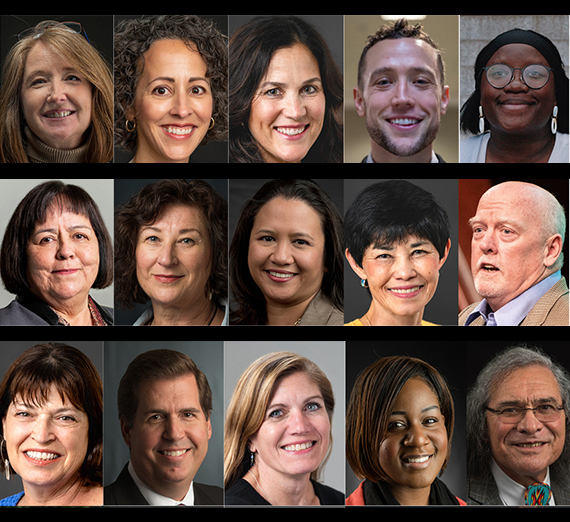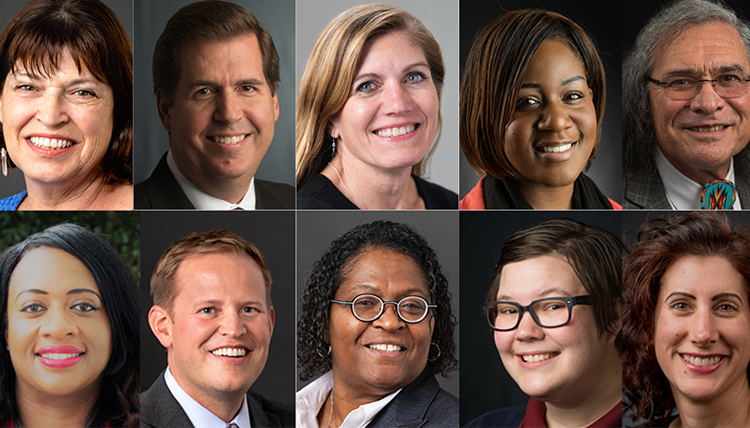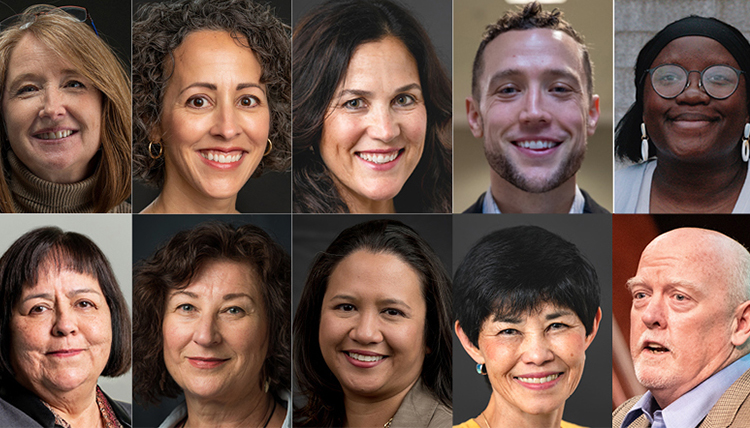BLM: A Dream Can Become Reality at GU

Not since 1963’s March on Washington that drew 250,000 people to illuminate the inequalities and challenges facing African Americans has this country heard a louder or more persistent outcry for racial equity and justice. Fueled by summer police killings of unarmed Black Americans, the Black Lives Matter movement has dramatically raised the level of America’s conscience, and that of our community, as well.
Gonzaga deans rallied, sharing their thoughts on envisioning an anti-racist practice in higher education.
“With each act of violence, hatred and discrimination wrought upon Black, Brown and Indigenous people in our country, we lose a piece of our souls because we allow hatred to persist. Our society is steeped in racism,” Deans Ken Anderson, Paul Bracke, Annmarie Caño, Yolanda Gallardo, Karlene Hoo, Rosemarie Hunter, Jacob Rooksby, Vince Salyers and Jason Houston wrote in a Sept. 4 message to the Gonzaga community. “These problems are systemic and so our response must be, as well.”
They called on all faculty to engage in understanding what racism is, how it functions and the power it can have when it is not addressed. They asked faculty members to demonstrate their commitment to this anti-racist work through courageous conversations, questioning teaching methods, examining curricular content and creating new policies or reforming old ones.
On Sept. 11, Gonzaga leaders Thayne McCulloh, Deena González, Kent Porterfield and Raymond Reyes said work is underway to “harness this contentious moment as a catalyst to address racial justice across the curriculum and co-curricular programming in the Jesuit tradition,” encouraging us to “work together to be better and to do better.”
President McCulloh shared in his Juneteenth message five actions “we are taking as a university community.”
- Engaged listening with students and colleagues – especially our community members of color – to understand their experiences and identify opportunities for support and intervention.
- Education as well as personal and professional development regarding prejudice and discrimination.
- Continued efforts to recruit, hire and retain a more culturally diverse workforce.
- An Implicit Bias Review of curriculum and pedagogy to evaluate what we teach and how we support culturally inclusive instruction.
- Supporting collaborations among key programs (and more): Diversity, Equity and Inclusion (DEI), Diversity, Inclusion, Community & Equity (DICE), Student Affairs, Mission & Ministry, Academic programs such as Critical Race and Ethnic Studies, Center for Civil and Human Rights (School of Law), Institute for Hate Studies (GIHS) and Center for Public Humanities.
Tide Beginning to Turn, But Work to be Done
Deb Ellis is the social justice programming manager at the Unity Multicultural Education Center (UMEC), which is part of DICE, and works primarily with students. She’s been here 10 years and has seen the tide beginning to turn on racism. And the opportunity has never been better to educate ourselves on racism, to listen to what people of color have shared with us, what we need to learn from, and to practice daily the work of anti-racism,” she says.
“By coming together, not being defensive, understanding our differences, not trying to change each other, we can become more creative in better addressing issues for the benefit of us all,” Ellis says.
UMEC offers two Gonzaga community events this month. “Talk About it Monday: It’s Not About Good Cops, Bad Cops,” is Oct. 5, a session tackling the history of racism in policing and what defunding police would mean. A collaboration with the Lincoln LGBTQ+ Resource Center, which is also part of DICE, “Calling In the Calling Out Culture,” features guest Loretta Ross on Oct. 13. She represents an approachable way to consider how we come together in community, and yet still hold structures accountable. Reservations are required for both, through Zagtivities. But her favorite student event is Diversity Monologues, scheduled in late March, which highlights student stories and experiences. “The vulnerability that these students share on stage is so powerful, and the learning that takes place leaves those who attend humbled by the experience,” Ellis says.
As part of the Division of Student Affairs, DICE organized professional development opportunities for their colleagues to increase cultural fluency and humility through book groups, film discussions and identity-specific spaces – a Black, Indigenous, People of Color (BIPOC) affinity group as well as a White Accountability Space. The latter addressed the question: How do I understand my privilege and my role in today’s environment? Not a comfortable conversation for many people in this country and here at Gonzaga, but necessary.
Cultural Fluency Opportunities
That same vulnerability is sometimes seen as an obstacle for faculty asking questions or participating in conversations around diversity, racial equity and justice. “Some faculty are not trained to be comfortable in conversations about racism and bigotry,” says Kristine Hoover, director of Gonzaga Institute for Hate Studies (GIHS). “But as more faculty and staff are wanting to learn about structural inequalities, they become more comfortable asking questions and engaging with others who ask questions.”
One of the challenges is providing proper intercultural training for established, as well as new employees. Are faculty hired for their intercultural fluency as well as their academic credentials? Are staff members evaluated on their intercultural competence?
DEI is doing its part. Nearly 900 faculty and staff have taken, or are in process of taking the Diversity.edu training. Associate Provost and Chief Diversity Officer Reyes and 11 Intercultural Development Inventory-certified trainers have administered the IDI instrument to 550 employees so far, following up with individual meetings to extend the conversation. New Associate Chief Diversity Officer Robin Kelley works directly with departments needing additional education, helping people to engage with each other across their differences and similarities, growing stronger relationships and understanding.
Reyes has introduced three initiatives this fall to help improve our intercultural understanding: Office Hours with Dr. Reyes, which he hosts via Zoom three times a month, Intercultural Yoga, a podcast he describes as a “provocative conversation, designed to stretch us out of our comfort zone,” featuring guests like former Interim Vice Provost for Student Affairs Manuel Gómez, Provost Deena González and Special Consultant to the President/COVID-19 Compliance Officer Charlita Shelton, and Diversity Digest, a monthly newsletter geared to faculty and staff as an equity resource.
GIHS is another University office dedicated to reducing racism and hate in all its forms. It is the only such entity of its kind in the country, hosted by a university, and provides support and expertise for campus programming as well as hosts a biannual international conference on hate studies.
Academic Offerings Expanding
Gonzaga has made significant strides in bolstering its academic offerings on the subject in recent years. For example, the Critical Race and Ethnic Studies program was created, adding new topic-related classes each year. A First Year Seminar, “Intergroup Dialogue – What’s Race Got to Do with It?” was awarded the Jesuit Association of Student Personnel Administrators 2020 Ignatian Award for Outstanding Academic Partnership. Associate Professor Melissa Click, then-First-Year Experience Director Kelly Alvarado-Young and Assistant Dean Joan Iva Fawcett joined forces to bring more diversity, equity and social justice into the curriculum. This class has morphed into a senior Core Integration Seminar, taught by Click and GUEST’s Tere Graham, and is a partnership between Communication Studies and DICE, overseen by UMEC Program Manager for Intercultural Development SR Gibson and Fawcett.
Meanwhile, three doctoral students in Gonzaga’s doctor of Leadership Studies program received their school’s inaugural Teaching Award, supporting their team-teaching with Hoover in her Organizational Leadership course on Leadership Strategies to Counter Hate.
Students raved about the class. One said, “This course is thought provoking and asks you to reflect on your lived experiences and understanding of society. It is painful yet freeing, and encourages you to be a better person and pursue a better world.”
Sport and Physical Education Assistant Professor Ryan Turcott teaches a class in International Sport Management & Culture, with a focus on understanding cultural competencies. “As a society, I hope we have learned that we can’t be neutral anymore,” Turcott says.
New Center for Teaching and Advising Director Mia Bertagnolli, along Hoover, business Professor Molly Pepper and Reyes, presented a two-session summer workshop on dismantling structural bias, which pressed faculty to take a close look at unintentional bias that exists in many of our classrooms, with intent to address it. Communications Studies Assistant Professor Juliane Mora and Kelley both presented.
These examples are but a small portion of the myriad initiatives taking place on campus. The need for a strong and continuing effort to find the roots of racism here and address them head on is a University priority.
A Call from Students
Fese Elango is Gonzaga’s student body president. “This summer I wrestled with the fact that I’m a Black woman at a predominantly white institution. I learned a lot this summer, but I still have a lot to learn to better understand my own experience,” she said, crediting Fawcett for being her inspiration. Elango hopes that her generation can create a catalyst to make this country a more equitable place for all people, but “we can’t do it alone. It will take a concerted effort by all people to move this initiative forward and bring about equity for all.”
As many in this story did, Elango pointed to Gonzaga’s Jesuit, Catholic and humanistic mission, and challenged this community to call out discriminatory acts and live up to the University’s ideals.
Kelley reminds us that white people must be part of the mix, to “galvanize the point that it will take their leadership to resolve our racial issues.
“Let’s make this discussion a part of the culture, not just for some people, but for all people,” Kelley says. “A white male once told me that ‘diversity’ doesn’t mean him. I told him he had a race, a gender, an orientation. Diversity is what makes us who we are. We are all diverse.”
“Poet John Keats once said ‘being blessed, we can bless, count your blessings.’ In this consciousness examen of how BLM and the current racial reckoning is forming, informing and transforming how we are living out our educational mission, it becomes obvious how blessed we are with an abundance of passion, commitment and creative ideas for future action,” Reyes said. “We are uniquely positioned, in the spirit of St. Ignatius, to leverage being practical visionaries to take our DEI commitments to the next level of excellence. Beatle John Lennon, in an interview about the song ‘Imagine,’ emphasized that ‘a dream you dream alone is only a dream; a dream you dream together with others becomes reality.’ Are you ready to dream? Let us all be the alchemist and transform ideas into reality, promise into practice when it comes to establishing and sustaining a robust multicultural learning community.”


